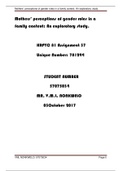Essay
Project 4808: Research Report
- Course
- Institution
Research report based on Project 4808, Ecosystemic Theory. A well-written research report, written in the required UNISA format. Scored a distinction for it . For reasearch assistance, Watsapp - Watsapp only!!!
[Show more]



